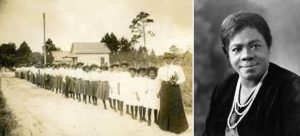Mary McLeod Bethune Civics Lesson
HBCU – Historically Black Colleges and Universities
Co-founded by Mary McLeod Bethune, Bethune-Cookman University is a HBCU (historically Black colleges and universities) in Daytona Beach, Florida; it was started, like other HBCUs, when the doors of higher education in the United States were shut to African Americans.
The Þrst HBCU rose from the commitment of Quaker philanthropist Richard Humphreys, who immigrated from Tortola in the British Virgin Islands, arriving in Philadelphia in 1764. Humphreys’ vision was to train African Americans for jobs, so he dedicated one-tenth of his estate to establish in 1837 the Institute for Colored Youth, which eventually became Cheyney University of Pennsylvania.
The vast majority of HBCUs were founded in the post-Civil War South to educate ex-slaves and as a response to the Jim Crow era when colleges and university excluded or restricted Black student enrollment, serving predominantly white students. This segregationist practice persisted in American higher education for a century after the end of slavery and did not begin to change until the Civil Rights era in the 1960s.
There are now more than 100 HBCUs across the nation, representing three percent of the nation’s colleges and universities. These schools are an array of private and public institutions, which, like Bethune-Cookman, have increased educational opportunities and broadened pathways of economic advancement and social mobility for African Americans.

